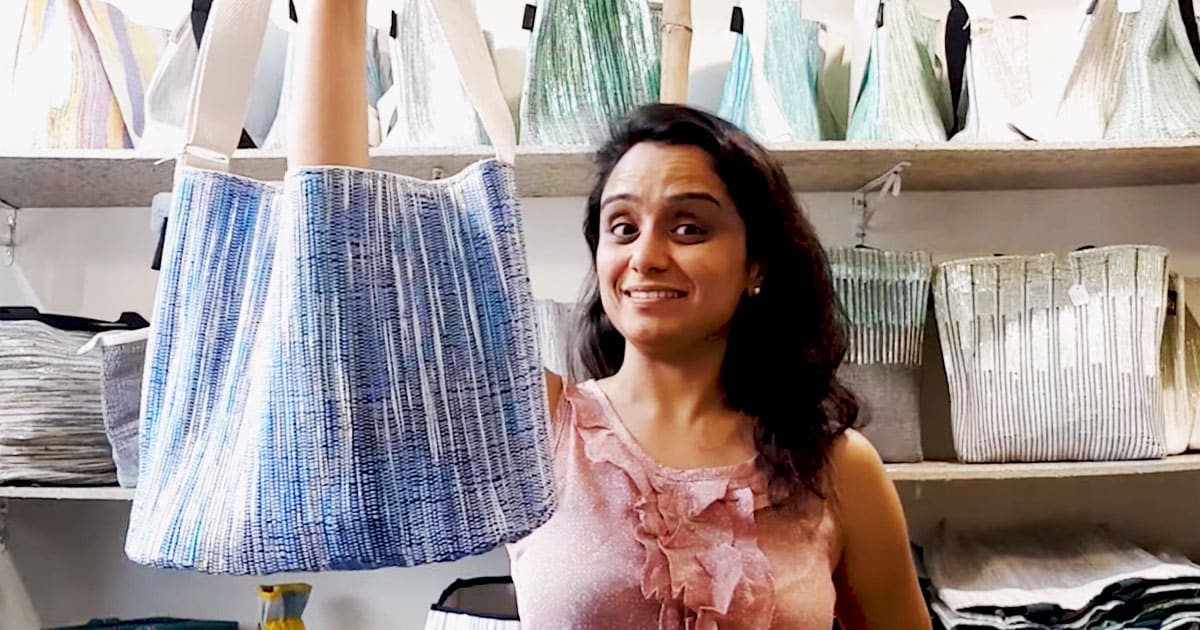An estimation by the Central Pollution Control Board states that India generates around 25,940 tonnes of plastic waste per day and approximately 9.46 million tonnes of plastic waste per year. And very little is done to recycle it. The majority of the trash remains in the landfills or goes into water bodies. Even the air we breathe has millions and billions of nanoparticles.
Meet Amita Deshpande, a software engineer cum entrepreneur whose startup reCharkha – The EcoSocial Tribe in Pune upcycles plastic trash into a range of aesthetic products.
reCharkha is reviving the Charkha, India’s traditional spinning wheel, to solve today’s world problems: plastic pollution, environmental degradation, and rural unemployment by converting plastic into yarn for a wide range of products.

Speaking to Life Beyond Numbers, Amita said that she had been distressed about the heaps of discarded wrappers and plastic covers, and so she was determined to find a solution to it ever since she was in college. She studied at Purdue University in the US and focused on sustainability, working with CSR teams of leading multinational corporations and community-based organizations. She returned to India in 2013 and founded her first upcycling project under Aarohana EcoSocial Developments in 2015. Later on, this project evolved into reCharkha during the pandemic.
Also, read: This Woman Is Recycling The Used Soaps From Hotels To Solve A Basic Hygiene Issue
“I worked as a consultant for CSR activities of several corporates but I wanted to do something more than working as a consultant. I realized that it was not enough to talk about plastic waste and the problems created by it. They do collect and segregate waste in cities but it is not the same in rural areas. Besides that, I discovered high levels of rural unemployment. My aim was to come up with a pragmatic solution that was sustainable, innovative, and created livelihoods for rural people while tackling the problem of plastic waste,” she told.

With research, she came across a process of spinning plastic yarn from the discarded plastic and weaving it into a fiber. And this was her eureka moment. She connected the whole thing with the good old Gandhian Charkha and found the most suitable system to solve all these issues in one go.
“It was not capital intensive nor did it create pollution. I informally attended classes for a couple of days to learn spinning on a charkha (spinning wheel) and weaving from a school for the visually disabled,” Amita adds.
The making of the fiber and products
The raw material is collected or bought from plastic rag-pickers which are then cleaned thoroughly and dried. Then the plastic wrappers and covers are manually cut into long strips with a pair of scissors. These strips are spun on a conventional charkha into plastic yarn and then woven into fiber that is used to make many kinds of bags, pouches, yoga mats, pen holders, plant holders, tablet covers, and more.
Creating the web of recycling
“We began in a small way from a tribal village in Dadra Nagar Haveli. After recruiting a trainer, we trained some of the women there in spinning the charkha and weaving the plastic yarn into the fiber. Six years later, many housing societies and apartments in Pune bring the segregated plastics that are washed and dried to our collection center at Kothrud in Pune,” says Amita.
Also, read: This Young Entrepreneur Upcycles Scrap Tyres To Make Sustainable And Fashionable Footwear
Today, reCharkha has 25 workers and an outlet in Pune. They also sell their products online which has been quintessential during the Corona outbreak. Lately, the tribe has been joined by a designer who reimagines the products and finds new ways to use plastic fiber.

They are now gaining traction and got supporters and well-wishers all over the country who send cleaned and dried plastic discards.
“Many organizations are now doing plastic weaving but it is not spun to this scale. However, people must realize that they must reduce the use of plastic. That is the only way forward. Our work has introduced many to the idea of reducing their use of plastic. That is a motivation for us to keep going,” she concludes.

